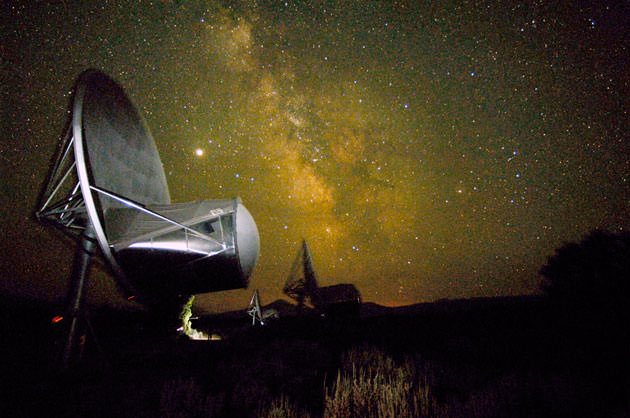During a hearing last week before the U.S. House Science and Technology Committee SETI scientists Seth Shostak and Dan Werthimer asserted that solid evidence for extraterrestrial life in our galaxy — or, at the very least, solid evidence for a definitive lack of it — will come within the next two decades. It’s a bold claim for scientists to make on public record, but one that Shostak has made many times before (and he’s not particularly off-schedule either.) And with SETI’s Allen Telescope Array (ATA) continually scanning the sky for any signals that appear intentional, exoplanets being discovered en masse, and new technology on deck that can further investigate a select few of their (hopefully) Earth-like atmospheres, the chances that alien life — if it’s out there — will be found are getting better and better each year.
Would you put your bet on E.T. being out there? Actually, you can.
Thanks to the internet and the apparently incorrigible human need to compete you can actually place a wager on when alien life will be discovered, via an Irish online betting site.

Typically focused on the results of international sporting matches, PaddyPower.com has also included the announcement of extraterrestrial life in its novelty bet section, hinging on “the sitting President of the USA making a statement confirming without doubt the existence of alternative life beings from another planet.” The odds of such an announcement being made in the years 2015-2018 are currently listed at 100 to one. After that they drop significantly… probably because by then the JWST will be in operation and we will “have the technology.” Stranieri.com also has offered a chance for Italian players of chance to bet on the sitting president discussing life from other planets, with betting open until 2025 for long-term gamblers!
Of course, whether you personally would place a wager on such things is purely personal preference, and neither I nor Universe Today condones or supports gambling, for aliens or otherwise. (And the legalities of doing so and any and all results thereof are the sole responsibility of the reader.) But it is interesting that we now live in a time when wagering on the discovery of alien life sits just a click away from the results of the Kentucky Derby, French Open, or World Cup.
Now if you really want to support the science that will make such a discovery possible — maybe even within our own Solar System — you can “stand up for space” and write your representatives to tell them you want NASA’s planetary science budget to be funded, and rather than gamble your money you can make a donation to support SETI’s ongoing mission here (or even help out yourself via SETI@home.)
And even if all else fails, you could end up with a free coffee courtesy of Dr. Shostak…
Learn more about SETI and how the ATA works here, and read Dan Werthimer’s May 21 statement to the House Committee here.
Source/ht: FloridaToday Space and The Independent
“Two possibilities exist: either we are alone in the Universe or we are not. Both are equally terrifying.”
– Arthur C. Clarke


Science ideologues like Shostak give science a bad name. He and others have been prattling on about this for years. “solid evidence for extraterrestrial life in our galaxy — or, at the very least, solid evidence for a definitive lack of it — will come within the next two decades. It’s a bold claim for scientists to make on public record, but one that Shostak has made many times before”
It is extremely difficult, nigh impossible to be able to state scientifically that ETs do NOT exist even though I believe that that could well be so for our galaxy. And our detection technology will also NOT be good enough to detect solid evidence for ETs that might possibly exist more than a fraction of the galaxy away, or even “close” by.
In the video in his talk, Shostak’s rush to assert that mere confirmation of ET’s existence will prove “we are not a miracle” actually proves no such thing. It appears that some people wouldn’t recognise a miracle if it had teeth and bit them. You see, Mr Shostak, a miracle is not defined by the odds against its occurrence.
So what is the definition of a miracle then, if it’s not an event extremely unlikely to have arisen by random chance?
You could go look in the bathroom mirror and fairly define yourself as a miracle, because if you think about it, it could be said that the entire universe starting with its big bang and proceeding through inumerable subesquent occurences, was needed to produce you, a unique as-one individual. That’s quite a backtrail of events that brought you to your feet.
How would confirmation of ET change any of that? It wouldn’t. If we used Shostak’s perspective, we’d say there is nothing special here because there are billions of us walking around. There can’t be billions of miracles! That’s not fair! 🙂
This post just makes the point that I firmly believe is true-discovering alien life will not “change everything” the way many people say it will. I hear this a lot from scientists of all stripes but I don’t think it will. Christians will just say “God did it” and move on. Other people will read the blurb on Google news and go back to the Kimye wedding. Some people will think it’s fake or some kind of conspiracy (a la climate change and evolution).
I hate to be so cynical but I just don’t think for a second that discovering alien life will in any way change human culture.
I think perhaps even more interesting is speculation regarding how science would view Shostak’s scenario of “solid evidence for a definitive lack of it”, were that to happen instead. How would they explain that. I do wonder if a discovery of life elsewhere in our own solar system may be touted to the public as bona fide alien life before research clears the panspermia hurdle, at least within our own system.
There are a number of things to consider with SETI research that I can make out.
The aliens they are looking for would have to be using a compatible radio system using the same spectrum we are looking in, and also the modulation type has to be compatible to how our systems are designed to receive. Then there is also the ability to recognize their concept of what an intelligent type of signal system they are using. There is no guarantee they use any type of similar binary or decimal system we use. We have to remember we would be dealing with a life form that can be completely different than what we are.
A very important aspect to consider is if we were to be able to listen to a signal that is from a few thousand light years from us, the signal we are listening to had to be sent a few thousand years ago because radio waves in space travel at the speed of light unless there is something in the path to slow them down a bit. This means the aliens that sent that signal may be long gone, or if they still exist the ones who sent the signal may have been dead for thousands of years (speculating they live a limited lifespan like we do…).
If we were to send a signal to a planet that is a few thousand light years from us, the people who sent that signal will be long dead by the time the signal is received on the distant planet. This is of coarse we are both using some type of compatible communications system to begin with.
Technically, maybe some intelligent signal will be received. I would not be surprised from one point of view if this does happen at some time in the future. I would also be surprised that our communications systems are compatible. There are many possible combinations even with very wide band systems.
From a practical point of view this SETI thing is really not going to do much for the average person, other than inject some drama in to their lives if some alien life form who has compatible communications systems is discovered.
We have to be careful about sending signals in to space. We don’t know if some hostile aliens receive it and decide to come here and take over. If they can come here, their technology including weapons systems could be thousands or maybe millions of years ahead of anything we can have or know about.
This could be a long drawn out subject that can be discussed for weeks on end. At this point most everything would be speculative.
This though as well includes picking up spectra from exoplanet atmospheres of ‘smoking gun’ life signs such as the ‘right’ mixtures of oxygen, methane, carbon…. Nice we have several different methods to use. I wonder which one will ‘win’? Awesome times, indeed, Mr. Major! 😉 I love your take on things in the WSHO’s as well! Your enthusiasm for the time in which we live is unmistakable and infectious!
Why I have a feeling that Seth and Dan make big noise from nothing?
Lost in all of this debate is the fact that, as per SETI Astronomer Paul Davies in the opening pages of his book, “The Eerie Silence”, that in the event SETI DOES discover an artificial alien signal, do you know to whom they are required to report it?
The U.S. Government.
And then, in Davies’s words, “it’s up to the government to decide how to best disseminate that information.”
Well Paul, judging by how the government has handled these matters since the 1940’s, I’m going to go with “not at all.”
Alien life could very well be confirmed to the PUBLIC within the next decade, and it will be the biggest revelation in history. But don’t hold your breath hoping for SETI scientists to be the ones to do it.